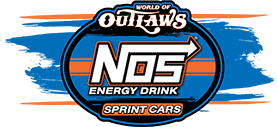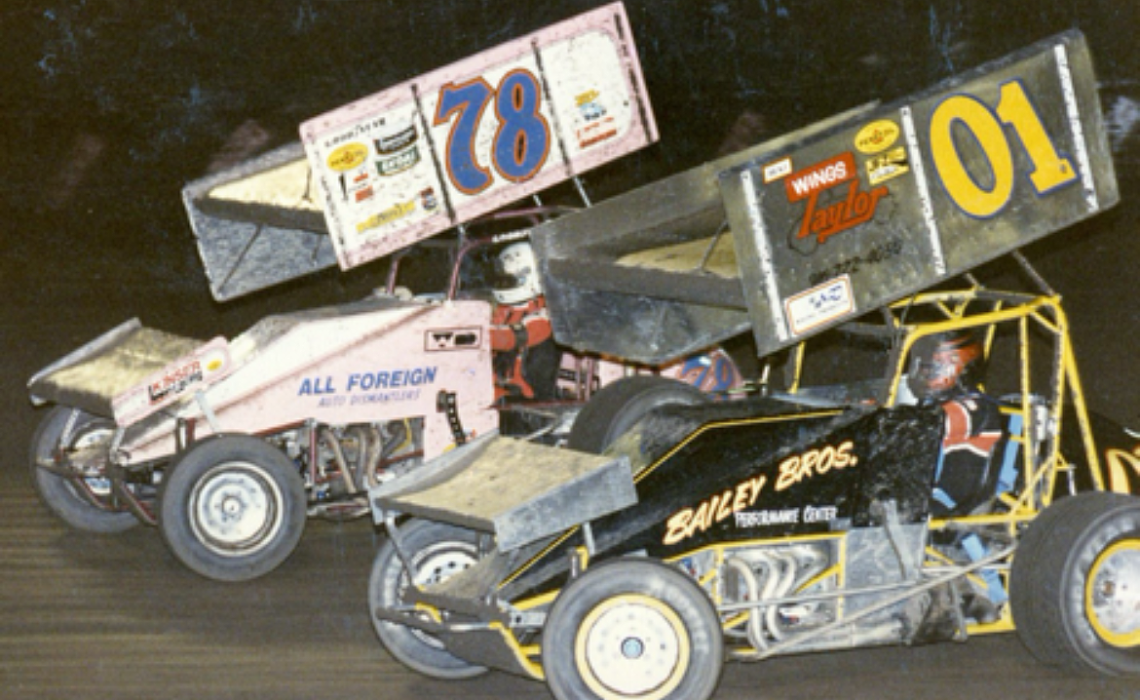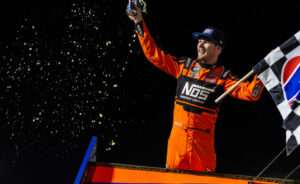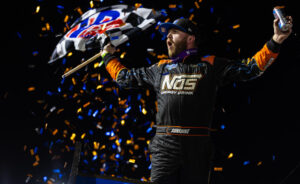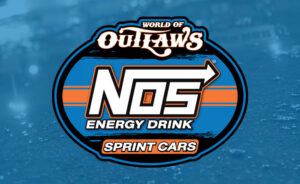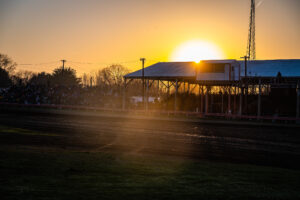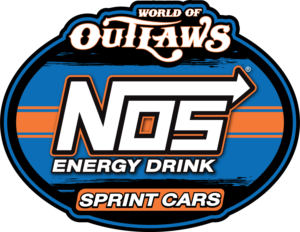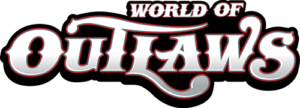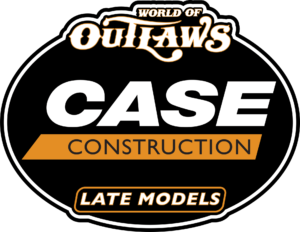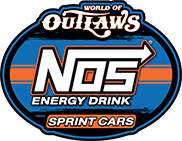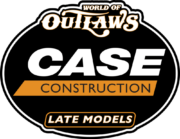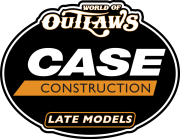Craig Keel was outlaw by nature. Non-conformist to his core, Keel unconventionally converted a late model to a modified then went sprint car racing when there was no place to race them within 200 miles of Keel Heating Oil in Weedsport, NY.
“He drove it that first night and said he’d never drive the modified again,” recalled Craig’s father Dan, forever the family spokesman. “It’s just faster, better racing: 25 laps instead of 195,” son said. “More money. Easier to work on. On a modified, you work all week straightening out the body.”
Keel’s 30-year career was unique to say the least. At age 16, he stepped off motorcycles for a street stock that he raced Fridays at Rolling Wheels, Saturdays at Canandaigua and Sundays at Weedsport. Before advancing in 1980, he called Hall of Fame builder Barry Wright in Cowpens, SC. “We went down south and bought a real late model,” was how Craig put it. After wins at Weedsport and Dundee, it became truly modified. “We put a (Gremlin) body on it. We had to add two-by-four frame rail.”
Craig’s crude hybrid made him 1981 DIRT Rookie of the Year by finishing fourth at Canandaigua and tenth at The Wheels between trips to Monroe County, Ransomville, Fonda and Five Mile Point. Weedsport was where Keel became the only DIRT Modified winner ever in a Wright Race Car. ”They outlawed our car,” Craig revealed. “We got the (Stock Car Racing) magazine car from Will Cagle.” Craig began 1983 on Florida DIRT of East Bay and Volusia before falling deeply in love.
“Dad, it’s the most beautiful thing I’ve ever seen.”
Son was speaking of the 1983 Gambler sitting at Shaver Specialties in Torrance, CA. New Yorkers who buy cars in South Carolina think nothing of trekking to L.A. for an engine. Keel relied on Ron Shaver power or parts for two decades. One of Ron’s employees was Arizona’s Wayne Bennet, who shipped that yellow sprint car to New York to wear Number Eight. Convenient for Craig was Brewerton Speedway’s decision to add 360 sprint cars to its Friday 320 modified card.
“We ran second the first night with it,” Dan said. “Then we won the next six in a row and quit going. He said, ‘It’s no fun. I want to go to Pennsylvania.’ We went to Selinsgrove with the little motor.” Selinsgrove was closer than Port Royal by 30 miles so Snyder County was where Keel’s converted bus parked on 12 Saturdays when Craig reached the Top Six on nine nights. They followed the United Racing Club to Maryland, Grandview and Penn National. When URC wandered to Weedsport, Keel defeated soon-to-be-champ Don Kreitz Jr. The first World of Outlaws visit to Orange County Fair Speedway in Middletown marked the series debut of Craig “Cricket” Keel.
Like most nicknames, Keel’s came from childhood when he thrilled to “The Wonderful World of Disney” on television. And because he became especially excited by Jiminy Cricket, he was so tagged.
With small Shaver 360 under brand new Empire Super Sprint banner, Craig captured five features at Fulton and one at The Wheels. Keels put their Gambler in Charlie Lloyd’s bus for Lernerville and Craig’s first 410 victory. Second at Selinsgrove and Williams Grove, Keel scored sixth when the World of Outlaws returned to OCFS (Orange County Fair Speedway).

“Going out to play in the mud to get the track ready,” he said. “First time I went to Baylands, I went out and came right back in. They made me go out last to time trial for doing that.”
Henderson had Keel back in 1985 for third at Calistoga, second at Chico and first at Baylands. In his first Dirt Cup, Craig set the fastest lap and landed second on two straight nights. Eighth at Petaluma was his best Outlaw run. Eighth at Weedsport was his World of Outlaws best at home. Keel did conquer PA Posse twice at Selinsgrove and once in Hagerstown, MD. Jenkins departed Gambler for Challenge Chassis Company and Craig followed Ken, who put Keel in Ron Pack Challenger to open 1986 World of Outlaws season in Arizona, Texas and OKC. Outlaw races in family Challenger scored sixth in Georgia and fifth in Maryland.
Keel’s phone kept ringing. Indiana’s Daryl Tate tapped him for Briscoe Mobile Homes Gambler that Craig steered to third at Bloomington and sixth at Lawrenceburg with wings then eighth at Eldora and tenth at Terre Haute in topless USAC form. Ed Watson and Ed Chinen also combined to give Craig some 32 West Coast starts that saw Keel notch 1986 NARC wins at Calistoga and Placerville in Chinen’s Hawaiian Challenger.
Over the winter of ‘86-87 was when Craig and Dan decided to try a full pull with World of Outlaws. They headed for Ascot Park packing two Challengers, two five-year old Shavers and stack of McCreary (eventually American Race Tire) rubber. “We were the first to go west of the Mississippi with a McCreary tire,” Dan proudly declared. Santa Maria saw 23 of 24 starters on Goodyear. Keel was the lone wolf whipping everyone but Steve Kinser. Dan and Craig were quick to credit Karl Kinser and Scott Gerkin for much advice. Keels calculated food and lodging as largest expenses so they constructed fiberglass tractor trailer with kitchen, beds and shower.
On a rainy night in Tennessee, I sat in that black rig and listened to Dan rant. Those who irritated him were “Communists” and those who really pissed him off were “Card-Carrying Communists.” Craig gave silent chuckles and whispered little. Why did low-dollar independants join this most elite circuit?
“Because it’s five and a half hours to The Grove,” Dan replied. “Bobby Allen’s the one who told us it’s actually less travelin’ then going back and forth. You’re going 3-400 miles but you’re always going to another show.”
They would never race as often as in 1987 when Keel made 107 starts. He finished ten of 68 World of Outlaws Features among Top Five, 33 in Top Ten and 50 times in Top 15. “You can turn a thousand a night easy.” He qualified fastest on nine nights with Denver’s record falling aboard Nance that Keels constructed in two Kansas days. On the Indy Mile, Craig’s engine exploded, locked the wheels and came to an abrupt halt against an infield pole. “I hit so hard I broke the glass in the gauges,” he sighed. His only injury was a fractured finger that required wire that Keel liked to jab into unsuspecting friends. He subsisted on peanut butter sandwiches and True cigarettes. Dan sipped hot tea and smoked Marlboro Lights. They were in Chicago when Craig learned that twin brother Eric had died from a motorcycle accident.
Craig began the 1988 World of Outlaws campaign in Florida and liked Ron Pack’s J&J chassis so much that he stopped in Tennessee to order his own. “He builds them the way we want,” said Dan simply of an association with Jack Elam that extended 20 years. Dan was as loyal as he was abrasive. Neither family car nor Gil Suiter Challenger could lift Craig into the Top Ten more than three times in 33 World of Outlaws Features. Holding no steel block for Kings Royal, Keel spent his schedule break in California Lightning of Larry Trigueiro. Keel qualified quickest four times in 1989, breaking records at Hanford and Bloomington. He had become a remarkable qualifier capable of two identical laps. “It’s just something that’s instinctive,” he shrugged. “It’s just hard for some people to gauge themselves.”
Keel competed in 48 World of Outlaws events in 1989 no better than eighth at Firebird, Memphis and Lincoln. He also strayed 15 nights into the rival United Sprint Association. “Ted (Johnson) asked us how much money we needed to get to (Mosport) Canada,” Dan grinned. “I said we only needed enough to get to Chillicothe. We made 1500 bucks and they got cancelled.” Fifth at Chillicothe was Craig’s top effort in USA. He placed eleventh in points with both clubs and won without sanction at Godfrey, St. Charles and Path Valley. Aluminum blocks with 60-pound penalties became legal for Kings Royal so Keel did start-and-park for a fast grand. They crunched numbers hard. Top 12 on Indianapolis Raceway Park pavement seemed impressive until the bill came. “We spent $700 on tires to make $400.”
Keel competed in eleven evenings with World of Outlaws in 1990 that earned eighth at The Grove. Eight races against All Stars topped out second at Attica on Ohio Speed Week after third in Gaffney, SC. Henderson summoned Keel for Dirt Cup, where they were fastest again. On their way up, they stopped in Oregon to conquer Cottage Grove. Craig’s best aspect of 1990 was meeting Willy Campbell of southern Illinois. In four of their first five starts, Campbell and Keel finished first or second. In four winged USAC races, Craig was second in Michigan and third in Kentucky guiding Campbell Magnum 01L.
Willy and the pump boys teamed for Craig’s return to the World of Outlaws in 1991 as Number Four “because four weighs half as much as eight,” according to Dan. In its fourth race, Car Four struck paydirt ($3500) at San Jose on driver’s 29th birthday. They ran 33 more World of Outlaws races that reached third at Kokomo. Best of a dozen All Star events was second-place in Danville, IL. Under no banner, Keel hit second at Millstream, third at Hagerstown, fourth at Lernerville and sixth in Brad Doty Classic at Attica.

At the end of 1993 was when Irma Keel became gravely ill. Son and husband stayed home to care for her. They reduced miles to emerge ESS champions after wins at Ransomville and Stateline Speedway. Craig defended his crown in 1995 by winning 11 of 28. As crew chief, Keel finished all 28 among the Top Nine. What was his biggest ESS adjustment?
“Twenty-lap features,” Dan laughed. Craig explained, “When you’re inverted back to 15th, it takes a few laps for things to thin out before I can get going. With the Outlaws, you get going right off the bat.”

After the fewest 410 starts of his career, Craig reversed that trend at Franklin’s Tri-City Speedway and Challenger, where he won in 2000. Keel competed exclusively at 410 cubic inches in 2001 by finally winning at The Grove and twice at Lincoln. The World of Outlaws staged 22 Support Series races in 2002 that stood apart from its primary Pennzoil circuit. Keel finished fourth in Benton, Beatrice and Fonda to place fifth in Gumout points. Eighth at Talladega was benchmark of 20 Pennzoil programs. Missouri’s U.S 36 Speedway welcomed 410 forces on Fridays and Keel captured one Cameron checkered. He split 45 starts evenly between All Stars and Outlaws.

Port Royal was where Keel docked on Saturdays in 2004, winning four times. Fridays split Craig between Clinton County and Williams Grove with third-place best at both. He remained at The Port to post another win in 2005 when he topped podium at The Grove. He spent most of 2006 at Grove, Port and Susky but could do no better than second. He won one of 23 Williams Grove starts in 2007 and one of 20 Port Royal races. He switched Saturdays to Lincoln in 2008 when Keel peaked second at Grove. When his attention turned to Ohio in 2009, some wondered why Craig competed Fridays at Attica and Saturdays at Fremont until learning that he had fathered a son there. May 29, 2010 at Fremont was Keel’s last documented race.
Craig died of cardiac arrest in the summer of 2016 two years before The Outlaws officially upgraded his preliminary to full status. That probably mattered little to him. He knew that on one glorious night on the enormous San Jose Fairgrounds, he beat the World of Outlaws and best of NorCal. The list of those worthy of such a claim is short. Yet many wonder how much better Craig could have been. He was usually too concerned with basic survival to truly thrive. He had all the tools. He also brought parental baggage. Dad wanted the best for son but only if they remained a team. Dad’s coarse nature ran off sponsors and wreaked havoc on son’s love life. Only when Craig became a father himself did they truly separate.
In the final analysis, Craig “Cricket” Keel won 67 sprint car features on 36 tracks in 11 states plus Quebec, a fine career for certain. Still we wonder what he might have done on new tires.
